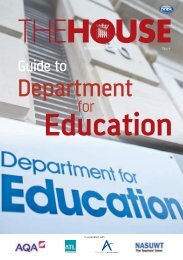Oracy
2fcBkno
2fcBkno
Create successful ePaper yourself
Turn your PDF publications into a flip-book with our unique Google optimized e-Paper software.
The ‘Woolsack Debating Society’<br />
30 primary schools from across Bradford compete in the annual Woolsack Debating Society<br />
competition. Schools join in triads and, each term, mixed age and ability teams from each school<br />
debate against teams from the other two schools. Each triad then selects six pupils to participate in<br />
an annual competition.<br />
Staff from Eastwood Primary School and Green Lane Primary School say it is an excellent opportunity<br />
for pupils to develop their debating and presenting skills, and that it helps improve pupils’ confidence.<br />
An additional benefit is that participants are able to meet pupils from different schools and areas across<br />
Bradford.<br />
Sharing Assemblies<br />
Once a year, pupils at<br />
Ascot Heath CE Junior<br />
School take part in<br />
Sharing Assemblies. Pupils<br />
individually present for<br />
between 3 and 5 minutes<br />
on a topic of their choice.<br />
Their class teacher<br />
helps them prepare the<br />
presentation, which is<br />
delivered to the whole<br />
school of 240 pupils,<br />
staff, and parents.<br />
Katie Browne, a class<br />
teacher, explains<br />
that the assemblies<br />
complement what<br />
is happening in the<br />
classroom:<br />
Pupils feel the Sharing<br />
Assemblies are<br />
valuable, increasing<br />
their and their peers’<br />
confidence:<br />
“I think it does help because they’ve had that<br />
experience of speaking in front of the whole<br />
school, … and so speaking in front of their<br />
class doesn’t seem like such a big thing”<br />
Katie Browne, year 6 class teacher<br />
“I was really nervous and stuff, but once you<br />
just sit down and it’s over and done with you<br />
feel really proud of yourself”<br />
Ella, year 6 pupil<br />
“It makes [quiet pupils] more confident. …They speak out more in class,<br />
they use it in the assembly, and start using it out in the playground. …<br />
They do [it], and they gain confidence and then they can do other things”<br />
George, year 6 pupil<br />
Helping all pupils become<br />
public speakers<br />
School 21 works with all its secondary pupils<br />
as part of its Ignite programme, in which pupils<br />
work towards and then deliver five minute<br />
presentations without notes. Year 7s build up<br />
their knowledge, confidence and skills for this as<br />
part of their work in oracy lessons, and pupils in<br />
years 8 to 11 work towards it in coaching groups<br />
of around ten pupils.<br />
The focus for each year group is different,<br />
and cumulatively builds pupils’ skills as<br />
public speakers. For example, year 7s deliver<br />
presentations on a topic about which they feel<br />
passionate, year 8s give presentations about a<br />
topic in which they have special expertise, and<br />
year 9s debate an issue of political significance.<br />
“In year 7 children come in and everyone’s got<br />
different levels of speaking, and by the end of<br />
the year every single pupil has delivered a five<br />
minutes, no notes speech. … Pupils don’t [always]<br />
think at the beginning of the year that they’re going<br />
to be able to do, so … it has a massive effect on<br />
their confidence, and that then supports them<br />
as they move up through the school”<br />
Amy Gaunt, Head of <strong>Oracy</strong> Primary<br />
“In different year groups it’s taught by different<br />
teachers, and in that way every teacher has to<br />
become a teacher of oracy. There are certain<br />
things they can take away for their lessons,<br />
and they can see the importance of oracy”<br />
Amy Gaunt, Head of <strong>Oracy</strong> Primary<br />
51




